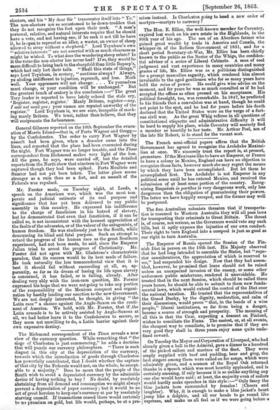Mr. Forster made, on Tuesday night, at Leeds, a speech
on the American war, which was the most tem- perate and judicial estimate of its real purpose and significance that has yet been delivered to any public assembly in this country. He expressed his indifference to the charge of fanaticism in his hatred of slavery, but he demonstrated that even that fanaticism, if it can be called so, is not inconsistent with the keenest appreciation of the faults of the advocates, or of the valour of the antagonists, of human freedom. He was studiously just to the South, while denouncing its blind and fatal purpose. Such an attempt to retard the progress of the human race as the great Southern experiment, had not been made, he said, since the Emperor Julian tried to arrest the progress of Christianity. Mr. Forster did not agree with Mr. Gladstone's characteristic paradox, that its success would be its best mode of failure. He took naturally the less transcendental view that it is best it should fail without succeeding at all, as, ap- parently, so far as its dream of basing its life upon slavery is concerned, it has failed, or is failing, already. After dealing very ably with the iron-ram question, Mr. Forster expressed his hope that we were not going to take any portion of the responsibility of the Mexican conquest and organi- zation by hastily lending our sanction to the new Government. We are not deeply interested, he thought, in giving " the Latin race" a chance against the Anglo-Saxon on the conti- nent of America. We hold, with Mr. Forster, that if ,the Latin crusade is to be actively assisted by Anglo-Saxons at all, we had better leave it to the Confederates to secure, as they seem not unwilling to do, a Latin barrier against. their own expansive destiny.






























 Previous page
Previous page